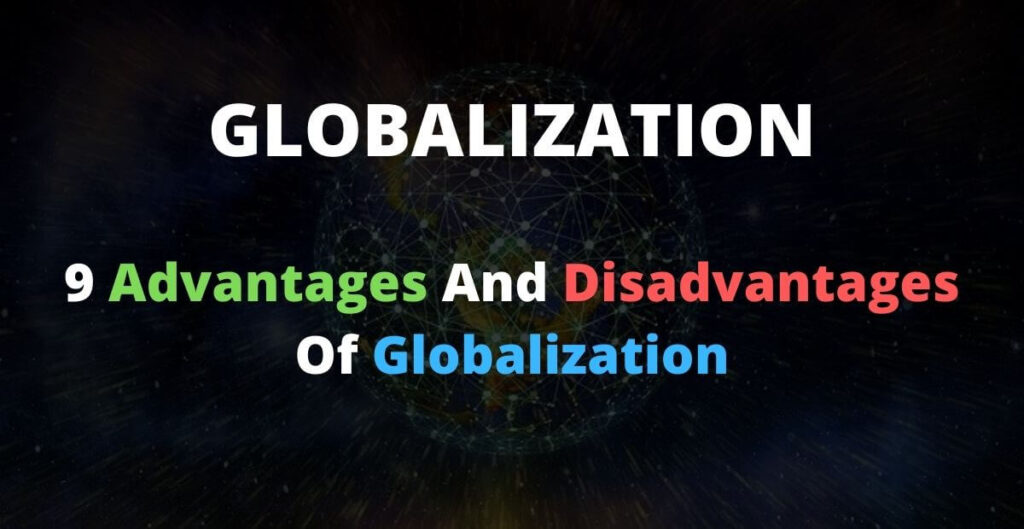Globalization is a global process that started in the late 1900s when things like investment, jobs, production, and marketing expanded beyond borders. Countries around the world are now connected and work together in these areas, creating a more interconnected and shared world.
Must Read- What Is Globalization and History of Globalization [4 Phases]
Advantages and Disadvantages of Globalization
Globalization brings both benefits and challenges. Let’s take a closer look at its advantages and disadvantages.
9 Advantages of Globalization
As a result of globalization, we all enjoy many advantages. these are-
- Transfer of Technology
- Better Services
- Standardization of Living
- Development of Infrastructure
- Foreign Exchange Reserves
- Economic Growth
- Affordable Products
- Contribution to World GDP Growth Rate
- Extensions of Market
1. Transfer of Technology
The transfer of technology around the world is beneficial. Countries can adopt new technologies through agreements and use them to improve their development. We can also communicate easily with anyone, no matter where they are, using advanced technology, saving time, money, and effort.
2. Better Services
Globalization helps improve the services we use. Thanks to technological advances, services like water supply, mobile networks, internet, and electricity have become easier and better. The easy access to the internet worldwide is also a result of globalization.
3. Standardization of Living
Globalization helps countries work together economically, which can reduce poverty and improve people’s quality of life. Many studies show that when a country opens up trade with the world, its economy grows faster, and people’s living standards usually improve.
4. Development of Infrastructure
Technological progress and its global sharing help improve a country’s infrastructure. This makes it easier for countries to provide better services to their people. Better infrastructure leads to overall development. It’s important to note that economic growth and infrastructure development go hand in hand.
5. Foreign Exchange Reserves
Globalization allows countries to build foreign exchange reserves by facilitating international financial flows. As nations engage in trade and investment with other countries, they receive payments in foreign currencies. These payments contribute to the accumulation of foreign exchange reserves, which can be used to stabilize the economy, manage exchange rates, and support international transactions.
Having sufficient reserves helps countries maintain financial stability and deal with external economic challenges, such as currency fluctuations or trade imbalances. In essence, globalization opens the doors for countries to grow their reserves, enhancing their economic security and global financial position..
6. Economic Growth
Globalization promotes efficient resource use by allowing countries to import needed resources and export surplus ones. This exchange helps balance resource distribution and fosters overall economic growth by ensuring that countries can access what they lack and contribute what they have in abundance.
7. Affordable Products
With access to the latest technology, the countries can provide products to their countrymen at affordable prices. Globalization promotes competition in domestic economies and in their endeavor to compete against competition, companies reduce product prices or follow a penetration pricing strategy.
8. Contribution to World GDP Growth Rate
Globalization allows each country to contribute to global GDP growth by participating in international trade, investment, and economic activities. As nations engage in the global economy, they help boost the overall growth rate, benefiting from increased opportunities and contributing to a more interconnected and prosperous world economy.
9. Extensions of Market
Above all, Globalization promotes the extension of the market. It provides an opportunity for domestic companies in Above all, globalization helps expand markets. It gives local companies the chance to go global. For example, when demand for their products or services slows down at home, globalization allows them to reach new foreign customers, helping them grow and meet increasing demand from other countries.
Must Read– 5 Important Types of Globalization
Disadvantages of Globalization
Globalization isn’t always perfect; it affects us in many different ways. It has some disadvantages as well. These are-
- Growing Inequality
- Increasing the Unemployment rate
- Trade Imbalance
- Environmental Loots
1. Growing Inequality
Globalization can lead to increased inequality by encouraging specialization and trade. While these factors can boost overall income, they may also create relative poverty.
For example, many large multinational companies (MNCs) are based in the United States. These companies often hire cheaper labor from developing countries like China, India, and parts of Africa to produce or assemble goods. This increases employment in those countries but leaves them behind compared to more developed nations.
At the same time, these companies may reduce job opportunities for workers in developed countries, like the U.S., because they are outsourcing jobs. As a result, both developing countries and developed countries may experience relative poverty.
2. Increasing the Unemployment rate
Globalization can lead to higher unemployment rates in some countries. Here’s how it works:
Globalization requires skilled workers at lower wages, but countries with weaker institutions may not have the resources to train highly skilled workers. As a result, unemployment rises in those countries.
When foreign companies invest in developing countries, they hire local employees. However, these employees often earn much lower salaries than those in developed countries, and the demand for their skills in wealthier countries is low. On top of that, during global economic crises, these jobs can be at risk.
3. Trade Imbalance
The balance of trade refers to the difference between a country’s exports and imports. Thanks to globalization, countries can trade with any part of the world.
In some cases, developing countries rely heavily on developed countries for imports, while their exports are much lower. This creates a trade imbalance, also known as a trade deficit.
A trade imbalance occurs when a country imports more than it exports. This imbalance can increase in developed countries due to competition from other nations.
4. Environmental Loot
Globalization is speeding up industrialization, which helps boost economic growth but also harms the environment. Many industries take too much from nature, causing serious damage.
For example, Coca-Cola is a leading soft drink company that uses a lot of water to make its drinks. In Uttar Pradesh, India, a Coca-Cola plant was shut down by the government because it used too much water, which local farmers needed. In North India, groundwater levels are already low, and using so much water for a foreign company’s benefit harmed local farming.
In Kerala, another Coca-Cola plant was closed because it polluted local water supplies. Multinational companies (MNCs) often exploit the natural resources of different countries for their profit. Many chemical industries also harm our health by polluting the soil, water, and air.
Conclusion
From the discussion on the advantages and disadvantages of globalization, it’s clear that the benefits can be extended further. However, there are also some drawbacks. Critics argue that globalization hasn’t helped the poor much, hasn’t had a significant impact on environmental protection, and hasn’t stabilized the global economy.
The policies set by the IMF, World Bank, and World Trade Organization mainly serve the interests of developed countries, focusing on their internal needs. Developing countries don’t have much say in these policies, and the views of these organizations on globalization reflect a specific economic and social perspective.
Let me share with you what you have learned from “9 Advantages And Disadvantages of Globalization“.


Comments are closed.